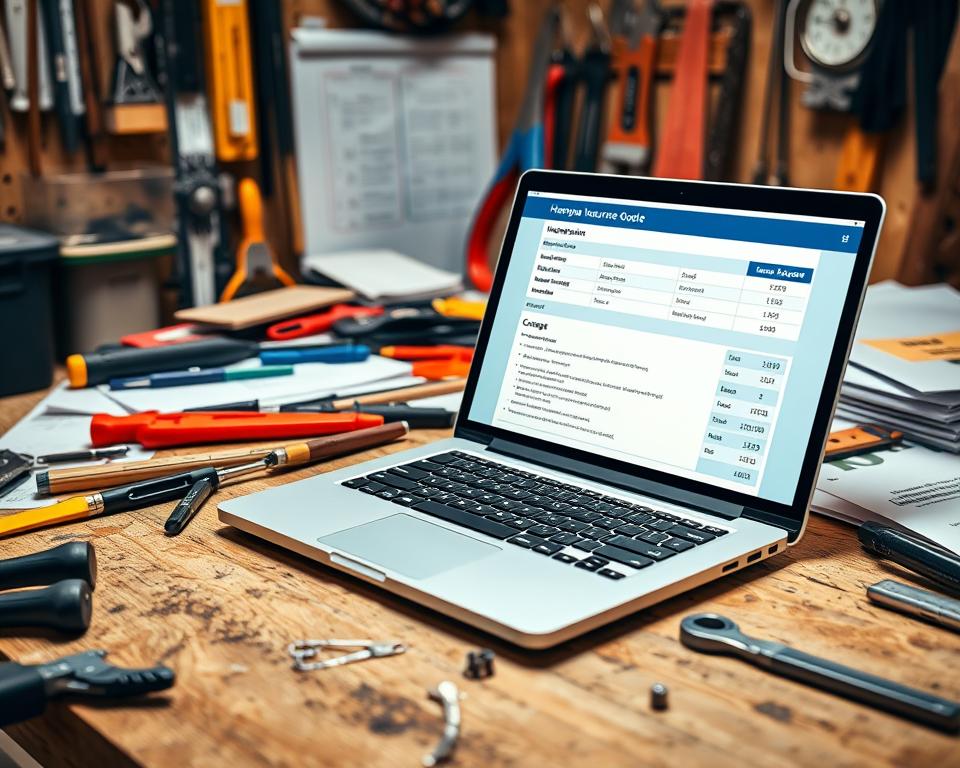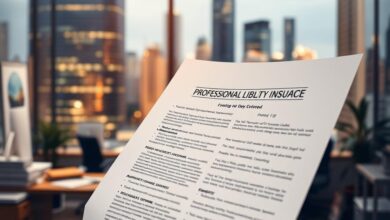Get the Coverage You Need: A Guide to Construction General Liability Insurance
As a construction business owner, you face many risks. Accidents can occur on site, putting your business at risk. That’s why construction general liability insurance is so important. It’s a key protection for your business.
This guide will explain why you need the right liability coverage. It will show you how to protect your business from different construction risks. With the right insurance, your business can stay safe and grow.
Key Takeaways
- Understand the importance of construction general liability insurance for your business.
- Learn how to protect your business against various construction project risks.
- Discover the benefits of having the right liability coverage.
- Get insights into choosing the best construction insurance for your needs.
- Find out how to ensure your business continues to thrive with the right protection.
Understanding Construction General Liability Insurance
Construction general liability insurance is key for any construction business. It’s part of a strong risk management plan. This business insurance shields companies from many risks they face.
Knowing what this insurance covers is important. It’s a must-have for construction firms. It helps deal with risks like property damage, injuries, and more.
What This Insurance Protects Against
This insurance guards against several risks. These include:
- Property damage from construction work
- Injuries to people on the job site
- Personal and advertising injury
- Medical costs for job site injuries
It helps construction companies handle these risks. It also prepares them for any claims that might come up.
Common Exclusions and Limitations
Even though it offers wide coverage, there are some things it doesn’t cover. Common exclusions are:
- Damages from intentional acts
- Liabilities from contracts
- Professional mistakes or omissions
- Pollution and environmental damage
Knowing these exclusions and limits is vital. It helps businesses manage risks well and get the right coverage.
Understanding construction general liability insurance helps businesses make smart choices. They can ensure they’re well-protected with the right insurance policy.
Why Your Construction Business Needs Liability Protection
The construction industry is full of dangers. This makes liability insurance key for managing risks. Construction companies face many risks, like property damage and injuries, which can cause expensive lawsuits and financial problems.
Legal Requirements and Contract Obligations
In many places, construction businesses must have general liability insurance by law. Clients also often ask for proof of liability coverage before they sign a contract. This insurance helps protect your business from lawsuits and makes you more trustworthy to clients.
Having the right liability protection is important for getting big contracts. It’s vital to check your legal needs and contract duties to find the right coverage for your business.
Real-World Claim Scenarios and Costs
Liability claims can happen from accidents, like property damage or injuries to others on your site. For example, if a contractor damages a neighbor’s property by accident, the neighbor might sue the contractor’s insurance.
| Claim Scenario | Average Cost |
|---|---|
| Property Damage | $10,000 – $50,000 |
| Bodily Injury | $20,000 – $100,000+ |
| Personal Injury (Libel/Slander) | $5,000 – $50,000 |
These costs can be very hard on businesses without enough liability insurance. With the right coverage, construction companies can lower these risks and keep their finances stable.

How to Choose the Right Construction General Liability Insurance
Finding the right construction general liability insurance can be tricky. It’s not just about the cheapest policy. You need to make sure your business is well-protected against risks and liabilities.
Assessing Your Business’s Specific Risks
To pick the right insurance, first look at your business’s risks. Think about the projects you do, the equipment you use, and your team size. For example, working on high-rise buildings is riskier than doing home renovations.
- Identify the types of projects you typically work on.
- Consider the value of the equipment you use.
- Assess the number of employees and subcontractors.
Coverage Limits and Deductibles Explained
It’s key to understand coverage limits and deductibles when picking a policy. Coverage limits are the max your insurer pays for a claim. Deductibles are what you pay first before your insurance helps.
Let’s say your policy has a $1 million limit and a $5,000 deductible. You pay the first $5,000 of a claim. Then, your insurer covers up to $1 million.
Essential Endorsements for Construction Companies
Endorsements add extra protection to your policy. They’re tailored to your business needs. Key endorsements for construction companies include:
- Contractor’s Pollution Liability Endorsement: Covers pollution-related damages.
- Employment Practices Liability Endorsement: Protects against employment-related claims.
- Equipment Breakdown Endorsement: Covers equipment breakdowns not in standard policies.
By looking at your business risks, understanding policy details, and adding key endorsements, you can get a solid insurance policy. This will protect your construction business well.
Steps to Obtain and Manage Your Insurance Policy
Getting and managing a construction general liability insurance policy has key steps. It’s as important to manage your policy well as to get the right coverage.
Finding and Comparing Insurance Providers
To find the best insurance for your construction business, compare different insurers. Look for those who specialize in construction general liability insurance and have a good reputation. Use online resources and industry forums to find information about insurers.
Key factors to consider when comparing insurance providers include:
- Coverage options and limits
- Premium rates and deductible amounts
- Claims handling process and reputation
- Customer service and support
Documentation and Information Required
When applying for construction general liability insurance, you’ll need to provide documents and information. This includes your business details, like name, address, and type of construction work. You may also need to provide financial information and details about your safety protocols and previous claims.
Cost Management Strategies
Managing the cost of your construction general liability insurance is key to staying profitable. Ways to manage costs include shopping around for quotes, adjusting coverage limits and deductibles, and implementing safety measures. Some insurers offer discounts for bundling policies or having a good claims history.
“Insurance is a critical component of a construction company’s risk management strategy. By understanding your insurance options and managing your policy effectively, you can protect your business from unforeseen events.” – Industry Expert
Filing and Handling Claims Effectively
If an incident happens, filing a claim quickly and correctly is vital. Make sure you have all necessary documents, like incident reports and correspondence. Work with your insurer to provide any extra information they need, and check on your claim’s status.
Protecting Your Construction Business’s Future
Construction general liability insurance is key for your business’s future. It protects against unexpected risks. Knowing what it covers and how to pick the right policy is vital.
This insurance shields your business from financial hits due to accidents or property damage. It helps keep your business safe and running smoothly. This is important for your business’s long-term health.
By following this guide, you can get and manage your insurance well. This keeps your construction business strong and ready for challenges. Protecting your business is essential for lasting success.









